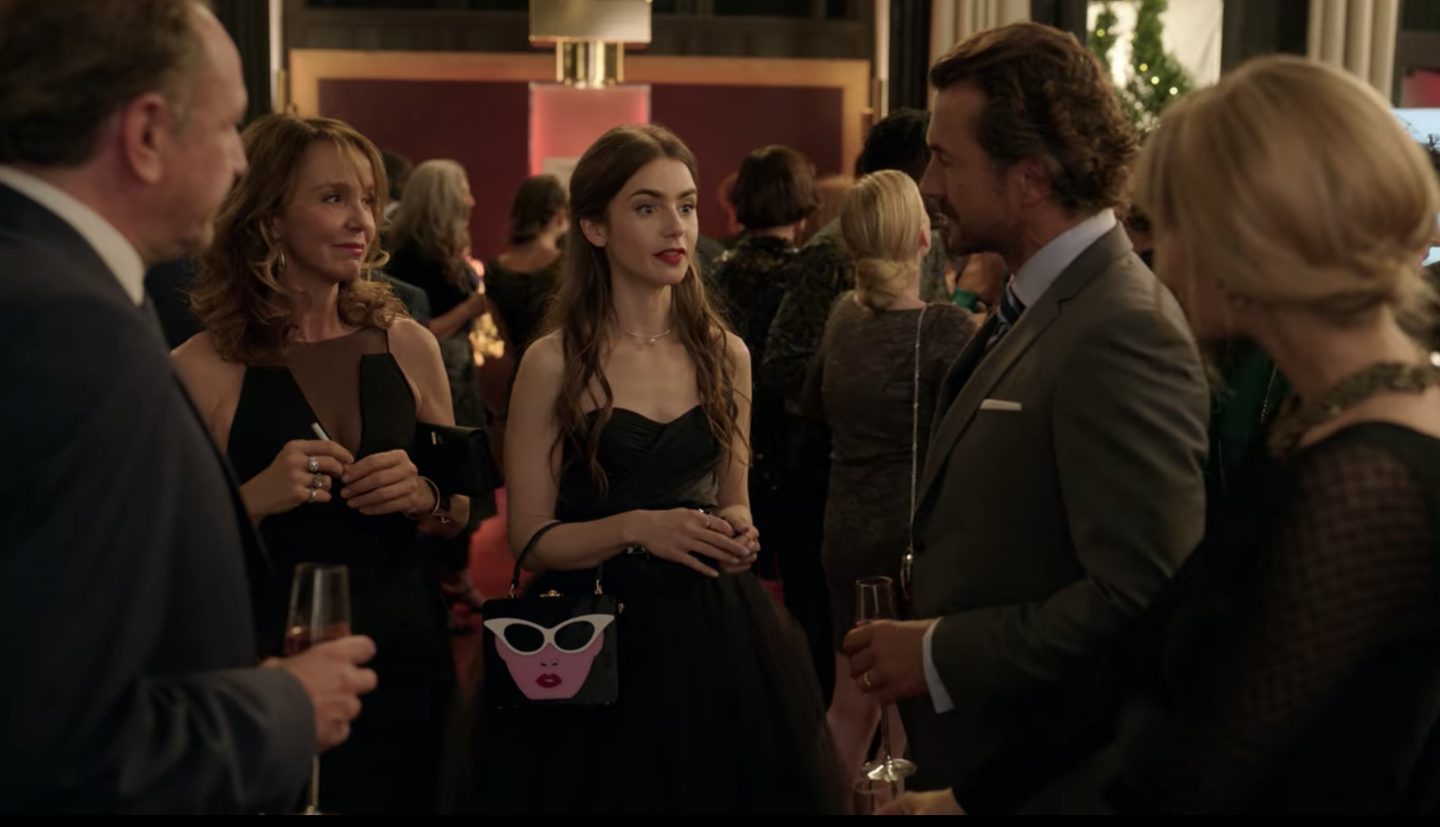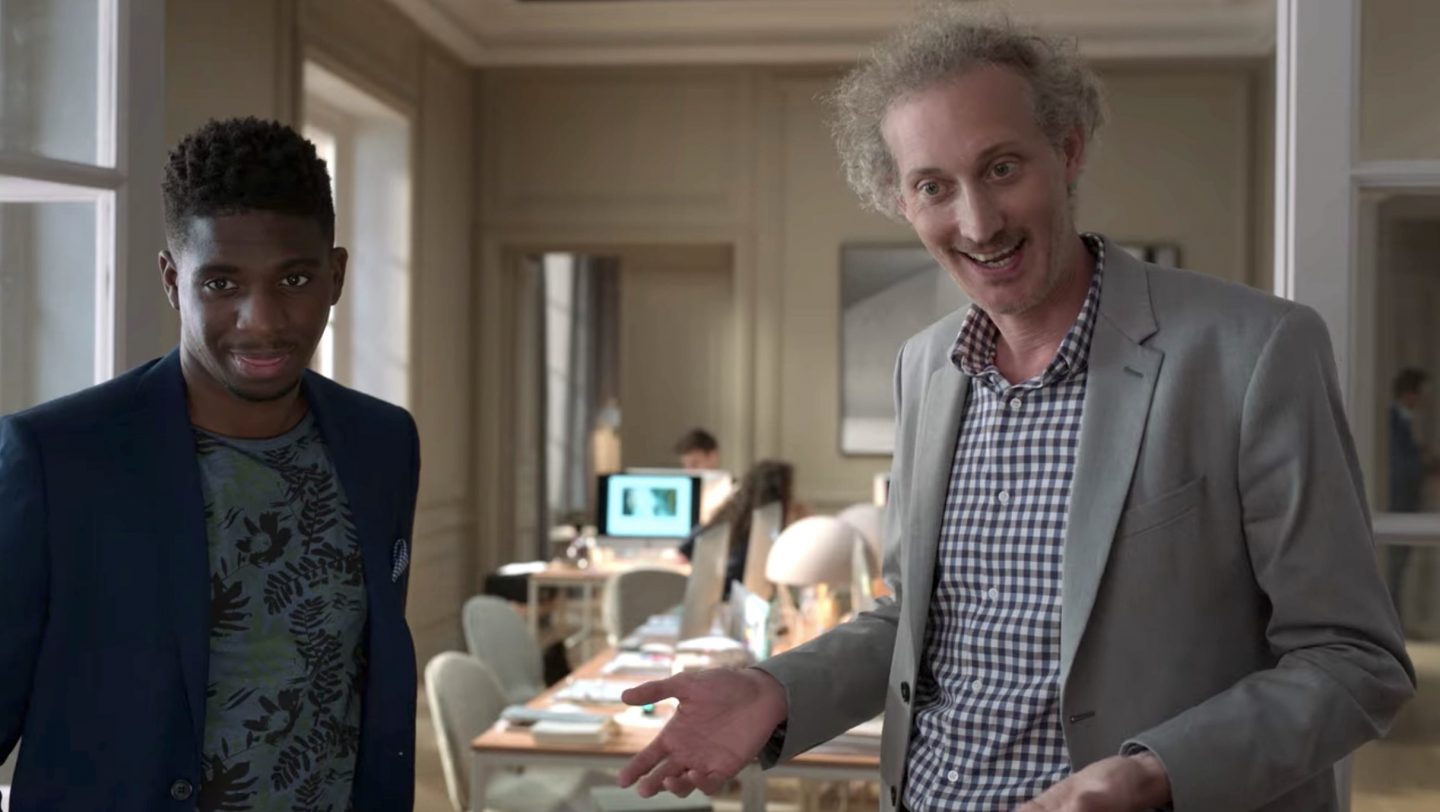In Love with the Actress

For H.
Always dancing in and out of view / I must have thought she’d always be around.
Jackson Browne, “For a Dancer”
In mid-October 2020 I saw a headline in the Financial Times noting the “pandemic relief in cliché-filled Emily in Paris.” Bylined Victor Mallet, in that great city, the piece pointed me towards a new hit series, “the most watched Netflix show in France,” and an evening of light escapism as our second UK lockdown loomed.
Not to bore those who know it, or share too many spoilers if not, let’s just say, a white American ingénue social media consultant Emily is moved by her Chicago-based company to Paris for a year to help out at one of their acquisitions, a French marketing agency named Savoir, which advises luxury brands. And where Emily is not welcome, especially at first. We see Paris, in all its romance, dirt, pretentiousness, disdain and occasional pockets of human warmth through Emily’s eyes and selfies. There are two further plot details I will share.
Sidelined by her white French boss, Sylvie, to work on a vaginal moistener for older women, Emily, who of course speaks no French, is horrified to discover that vagin is a masculine noun in that language. Sylvie explains to her that the vagina may be owned by the woman but is possessed by the man. Emily posts that the vagina is not masculine and the professional doors are flung wide open for her when Brigitte Macron approvingly retweets this insight.

Then Emily debates with an elderly male client — backed by the gender-collaborationist Sylvie, who also happens to be his mistress — whether a perfume ad featuring a Helmut Lang-style nude Serbian blonde crossing the Seine on a bridge awash with the male gaze is “sexy” or, as Emily on behalf of enlightened American consumers believes, “sexist.” Emily’s solution is to suggest resolving the contradiction by putting the ad up for a controversy and positive publicity-generating (either way) “sexy or sexist” vote on social media. Win-win.
This second improvised stroke of genius works as a kind of aesthetic meta-tag for Emily in Paris itself. Accomplished popular art, as its greatest practitioners from Joni Mitchell back to Shakespeare know, does not direct the viewer in terms of what to think or feel. For all its play with stereotypical imagery Emily in Paris has a shot at that generous dialogic give-and-take spirit. It goes for the negative capability once attributed to Shakespeare by John Keats, or the meaning complexity and density Parisian semiologist Roland Barthes dubbed écriture, as distinct from a formulaic and easily decoded écrivance. In this mode the viewer or reader is invited to be as much creator as interpreter of meaning, invited to interact with a range of possible emotional and intellectual responses. I will accept this invitation and freedom here — in the same spirit of “take it as you like it.”
I have a personal stake in the invitation to visit Paris in Emily’s selfie and Instagram mode. Let us first note that there is a shadow text operating here. Emily in Paris, of course, revisits the 2001 French blockbuster Amélie, in the great modernist tradition of textual shadowing which includes James Joyce in Paris composing Ulysses via reworking Homer’s Odyssey.

Having once fallen in love with an uncannily Amélie-like (but English long-term expat) actress and spent two years in pendulous Eurostar oscillation to be with her in Montmartre every other week, for me the Netflix series brought back beautifully shot memories of favourite Parisian haunts and the way we were. We spoke at our first meeting of the poignancy of being unaccompanied in what she called “the most romantic city in the world,” and of our individual predilections in relation to the romantic view of life. We came together in classic Rom-Com fashion through a kissing accident — my Welsh ineptitude around the codes of what constituted a polite farewell in France leading to an unplanned deviation into what, as a teenager in Wales, we used to call, perhaps inaccurately, a French kiss.
In the words of Neil Young’s most plangent love song, titled in troubadour fashion “A Man Needs a Maid” (Barthesian écriture at its finest, therefore partly ironic perhaps as all great love songs may need to be at some level), she was playing a part that I could understand. For me this, like an unconscious and repetitious mantra of love and loss, has become one of the great non-directive zen lines of world literature, up there with Virgil’s lachrymae sunt rerum (the tears of things) and “to every thing there is a season.” We can only, at our best, ever be thus — playing a part the other can understand. Tout comprendre c’est tout pardonner. One plot detail I do recall sets this story in a historical context, as resonant as the febrile ambience of 1945 England in Brief Encounter. At the very end came the Je suis Charlie mass uproar in Paris and throughout France. This sharply divided us and had to be set to one side. But whenever I hear that phrase there lingers a distant melancholy echo of romance’s immaculately turned out cabin crew finally announcing “prepare for landing.”
As a literary and cultural critic, way too impressed at one point by French theory — I can never approach these matters without sounding to some extent like a bad translation of the later Barthes — I would put my tentative stake in the ground and sum up Emily in Paris as a French-hating, American-hating, Friends-like in some ways, satirical light comedy for the Insta age. More personally and on an emotional level, as a socialist, a Celt and a mild social media sceptic, I’d ask what isn’t there to love about all that? Pausing the first draft of this piece three episodes into the series and, if fortunate enough to be spared by the Donald virus, determined to watch the whole thing, I was mainly hoping that at some point the jaundiced lens would turn as well to the savoir vivre brigade, the city’s Paris-fetishizing English and American expat community.
For other once temporary Parisians and recovering expats the picture is very different. While remaining eternally myself a vicariously enamoured Parisian, as a cultural observer I have gathered over the years impressions from others better able than myself to maintain some critical distance. Quoting, for example, a distinguished brand semiotician acquaintance, who will remain anonymous: “My overriding personal memory of the city is of a great open pissoir, with occasional bursts of tacky grandeur and extreme rudeness, sometimes taken neat, other times encoded as baroque good manners.” From a friend who spent time in Paris as a student: “the Bastille Day fireworks display that culminated in the highest flying rocket of the night and its puff of pink smoke resolving into the shape of a heart, the crowd’s gasp of recognition, romantic icon of a city marked by the cynicism of l’heure bleue, that special time of the afternoon for routine scheduled-in adultery.” Another colleague recalled, during her time there, Monsieur le Président wearing a full-face helmet with a portentously tinted Darth Vader visor, riding pillion on his secret serviceman’s moped, caught by the paparazzi en route to see his mistress, with one hand clutching his baguette and the other hand in his pants. The outrage of French polite society at that invasion of the great little man’s privacy.

But… And… Yet… Rien de Rien. Je ne regrette rien. I remain among the world’s most ardent Francophiles. I heart Paris almost to distraction. The extraordinary down-to-earth daily presence, affection, warmth (for those who are open to it) and decency of those some of my white Parisian friends, quietly and in rare moments of disdainful candour, would refer to as les Arabes. The Bal des Pompiers on the 14th July when the true democratic spirit of medieval carnival and popular feast reigns for one night in every quartier. The spirit of the yellow vest saying NO in that timeless, sublime, bloody-minded way that only France knows how. While M. Macron attempts his ideological and economic coup in the great bastion of community and freedom — a full four decades out of time, in the distant wake of Reagan and Thatcher who, back in those heady days, kicked egalité and fraternité summarily out of the offer and translated liberté into liberalization and a starting pistol for the global spread of what Noam Chomsky calls “the plague of neoliberalism.”
I have been warned by my special adviser on colloquial French nuances — my personal stylist Jean-Huarte — always to say sapeurs-pompiers when referring to firemen (much loved and objectified by the Parisian gaze as they wiggle their well-toned bottoms while saving kittens from trees or jogging ostentatiously around the city). Pompier, he says, has taken on by now almost exclusively its once secondary meaning of ‘blowjob.’ This, Jean says, is because the French have no concept of double entendre — it’s either one way or the other with them. Nevertheless, at the risk of scorn, derision, even hurtful innuendo, I ended my first draft with: Je suis le Bal des Pompiers! Je suis les Gilets Jaunes! Je suis les Arabes!
Three nights later I had finished watching all 10 episodes of Series 1. My editor had asked me to finish the piece by returning to Emily in Paris for a few closing remarks, to sandwich the personal material. Just then, to coin a phrase, all hell broke loose on the European news channels and there was a lot more to say. A school teacher in the suburbs was beheaded after showing his class the notorious cartoons. And the world of Je suis anything and the French white supremacist disdain for Les Arabes and their Prophet was, for the moment, no longer appropriate for a light-touch piece.
Much remains to be said but the clock is ticking. A 12-inch extended version of this piece would include my lifelong fascination with the codes, tropes and iconography of romantic love, an unforgettable night of drinking and reminiscence about love and writing with John Fowles, a semiotic collaboration with David Freeman who wrote the Annie Lennox hit “No More ‘I Loves You’s,” about how when love goes we may miss the language and mythology more than we do the nominal human object (or subject) of our affections. I love you so much I can’t wait for you to go away so I can think about you. That song is an astute anticipation of Insta-love. Its title is taken directly from Roland Barthes’s A Lover’s Discourse.

There would also be more spoilers from Emily in Paris. The protagonist’s first physical sexual encounter in a foreign land when a white Parisian professor of semiotics called Thomas (you have to hear that pronounced in the French way toe-mah with an equal stress on both syllables) slides down out of shot and the startled look revealed in close-up on Emily’s face suggests, in an astonishing tribute to American men, that at the age of (what? I’m guessing) 40 she is going through her first experience of having a pompier administered to her. Jean-Huarte was unavailable to comment on whether this resonant signifier is appropriate when the man and woman are in this particular configuration. Risking derision I will deploy it thus. And throw down the gauntlet to the finest of Parisian masculinity to administer the full pompier thus, to prove that a maid still needs a man and that they stand proud for ever as an aspirational model of true manhood for les sales Americains.
Et voilà… I asked my friend Helen, an artist and film professional working in the care sector for the duration of the pandemic, for her frank appraisal of Emily in Paris. As a final check from a real person, untainted by either a voyeuristic cultural interest or any personal axes to grind. “It’s crap,” she reported. “Like a Disney film. All those predictable facial expressions. Like a cartoon. Ah, but that’s your job watching that stuff, the cultural interest, isn’t it?”
This reality check brought me back to my initial feeling that the show was like Friends in some frothy lifestyle way — and the series is indeed created by the producer of Sex and the City. We are looking at roughly the time of the original Amélie. I remember reading something an American media studies professor wrote around then. About the fantasy utopian New York of Friends. Infantilised 30-somethings living the dream of 10-year-olds or of bored frustrated adults with lives stifled by consumerism and anxiety about all kinds of looming catastrophes. A New York, he wrote, in which planes do not fly into tall buildings.
And here we are with Emily. In Paris. With as many stereotypes as you can shake a stick at. But all drowned out by the clamour of the symptomatic absences. No banlieues, no Bataclan, no Charlie, no Gilets Jaunes, no BLM, no writing of a more truthful version of history to celebrate the basis in slavery, colonial and class exploitation of all the complacency, luxe and savoir vivre. Meanwhile the essential workers carry on saving the world, struggling for equality and fraternity, beginning to tell the real story. After 10 episodes and feeling like I’d pigged out on a family sized Christmas drum of mass-market chocolates I remembered Netflix also has Spike Lee’s Da 5 Bloods. The perfect antidote. I’d recommend you watch that. With its spine-tingling voice-track only version of What’s Going On as the end approaches.
“Only love can conquer hate.” Je suis Marvin.

